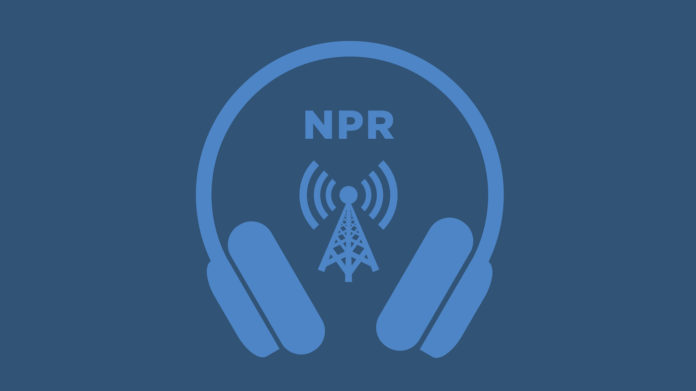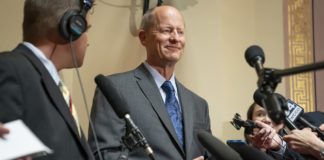
LEILA FADEL, HOST:
This week the Department of Veterans Affairs announced that LGBT veterans discharged from the military under its “don’t ask, don’t tell” policy may now have access to VA benefits like home loans, health care and money for college. This will apply to veterans who were given other-than-honorable discharges due to their sexual orientation, gender identity or HIV status. The announcement, though, comes 10 years after the repeal of don’t ask, don’t tell allowed gay service members to be open about their sexualities. We wanted to take a moment to mark this anniversary, so we spoke with three veterans about serving under that policy and its lingering effects on them.
(SOUNDBITE OF LAURA VEIRS SONG, “SONG MY FRIENDS TAUGHT ME”)
TAMMY SMITH: My name is Tammy Smith. I’m a recently retired army major general. Before don’t ask, don’t tell, the policy was so strict. The military didn’t want you to exist. And so when don’t ask, don’t tell came into place, for me, what it felt like was at least the acknowledgment that I existed. I think of it as I had two sets of friends. So I had the people that I worked with, and then I had a whole separate set of friends that were kind of my off-the-grid friends. And those were the members of the LGBT community.
And it was not uncommon – if you passed by someone you knew off the grid, you would walk past them and pretend like you didn’t even know them because you never wanted to risk having to explain to somebody. It’s like, well, how do you know Jones (ph)? And I will always hold that feeling of what it felt like to walk past my friend and pretend like I did not know them.
(SOUNDBITE OF LAURA VEIRS SONG, “SONG MY FRIENDS TAUGHT ME”)
LINDSAY CHURCH: My name is Lindsay Church, and I was a second-class petty officer and linguist in the Navy for four years. Serving under don’t ask, don’t tell is to know that if you slipped up, your life would be ruined. When I served, I couldn’t keep a romantic partner. I was hospitalized for three surgeries while I was in service. I spent 55 days in the hospital, lived in the medical barracks for five months. I couldn’t involve my partners in nearly losing my life in a hospital. I could only involve my mom and people that nobody would assume were my partners.
I literally broke up with somebody because she sent me two dozen roses while I was in the hospital, and I was too scared that I would get caught. So her not understanding how much fear I lived in felt like a denial of what I was going through. And so I just ended it because it was easier than navigating the uncertainty of whether or not I was going to get caught. Nobody was ever penalized for asking. A lot of people were penalized for telling or not telling and getting caught. And this younger generation won’t feel what it felt like to live under don’t ask, don’t tell, but it doesn’t mean that they’re not going to serve in a homophobic or transphobic military.
LATONYA WHITE: My name is LaTonya White. I go by Tee White. I was in the military for 15 years. I was active duty Army. I felt like hiding my queerness was the price I had to pay to do the job I wanted to do, to get the results that I wanted to get out of life. And so it was like, if I can’t be gay, I won’t be gay. And that’s just how I lived my entire military career.
Like, I was a soldier, and then I was Black, and then I was a woman. And then, you know, and that’s how it went for me because the soldier was the one that paid my bills. And everything else will come second, third or not at all. The truth of the matter is being Black and being a woman in the military is hard enough. And with don’t ask, don’t tell before it was repealed – good. Now it’s not something else that I have to fight. It’s just that simple. I had enough uphill battle. There’s no need to add more to the load.
(SOUNDBITE OF THIS WILL DESTROY YOU’S “I BELIEVE IN YOUR VICTORY”)
WHITE: The VA making the announcement about giving benefits to other-than-honorably discharged veterans – I mean, I feel like it’s one of those, oh, we got you now. Oh, thanks. Have you seen enough deaths? Have you seen enough hospitalizations? Is that what it is? – because a lot of people who got dishonorably discharged or less-than-honorably discharged because of being LGBTQ are the same people who need the VA’s help and assistance, especially when it comes to mental health. So do I think the VA made a good decision? I do. I think there’s still a lot of way ahead.
CHURCH: Most of these folks are not ready to talk about this. They’ve already decided that the system isn’t for them and that they have endured enough in their military service, that they don’t want to go back and face the shame and face the judgment. And so VA and DOD have a lot of work to do to reach those folks. Otherwise, they’re not going to take advantage of this. Like, they’re just done.
SMITH: When I had the opportunity to meet veterans who had been discharged under don’t ask, don’t tell or the policy that existed previously, I made sure that I always said, I want you to know that me, as a senior officer, know that your service was as honorable as any other service member and what you did for your country was as important as any other service member. So I think this announcement is indeed healing.
FADEL: That was Army Major General Tammy Smith, former Navy Officer Lindsay Church and former Army Sergeant LaTonya “Tee” White on their experiences serving under don’t ask, don’t tell.
(SOUNDBITE OF THIS WILL DESTROY YOU’S “I BELIEVE IN YOUR VICTORY”)
Copyright © 2021 NPR. All rights reserved. Visit our website terms of use and permissions pages at www.npr.org for further information.
NPR transcripts are created on a rush deadline by Verb8tm, Inc., an NPR contractor, and produced using a proprietary transcription process developed with NPR. This text may not be in its final form and may be updated or revised in the future. Accuracy and availability may vary. The authoritative record of NPR’s programming is the audio record.








